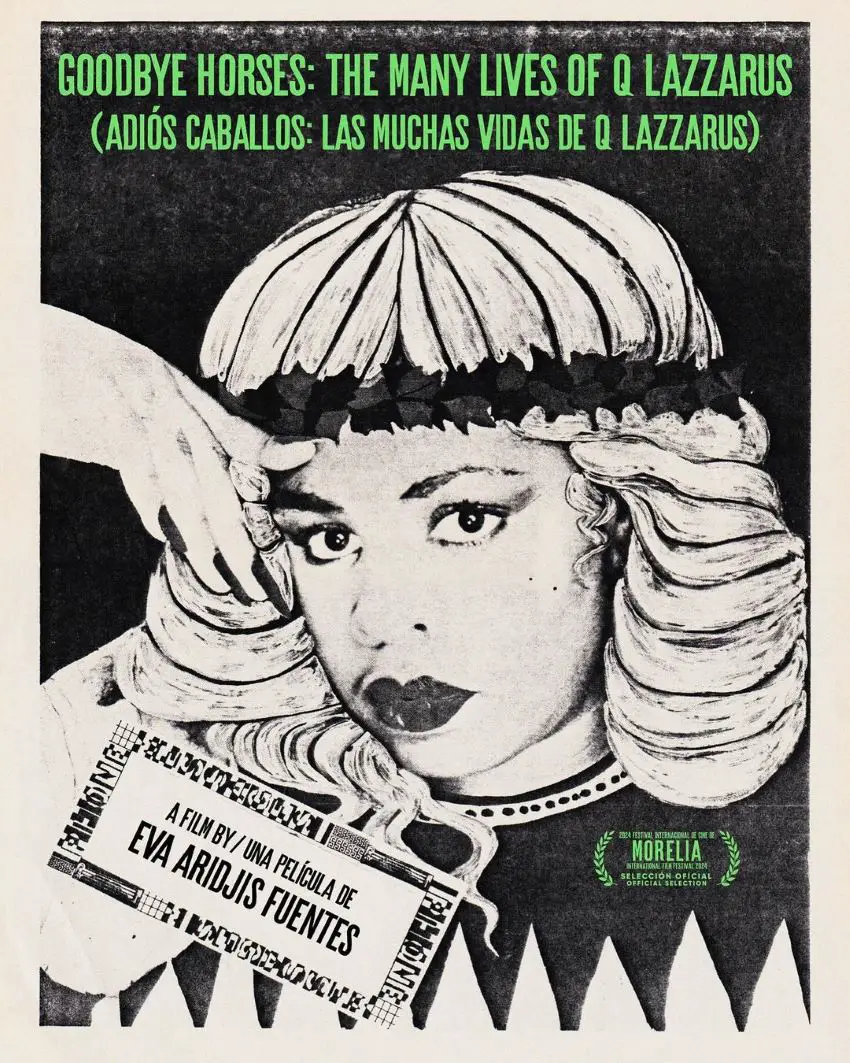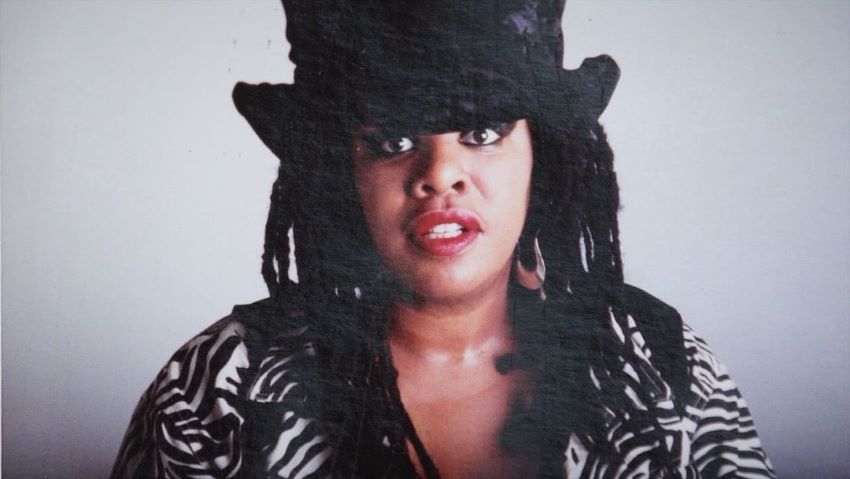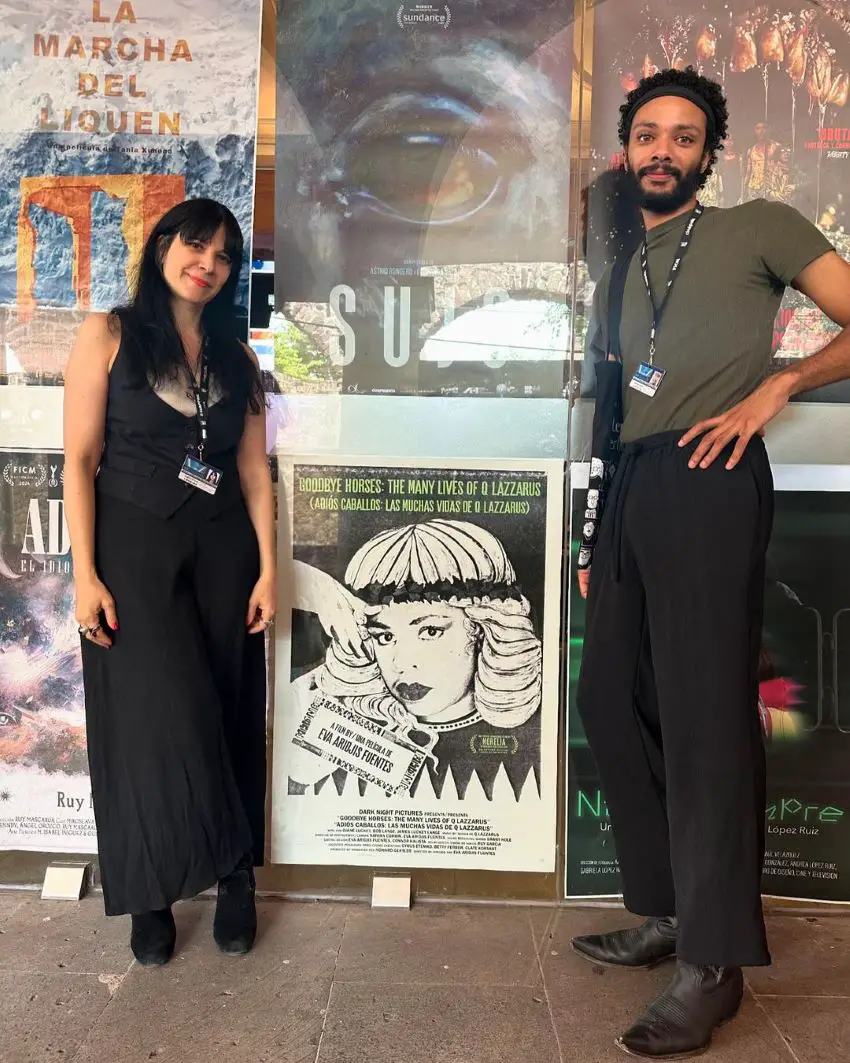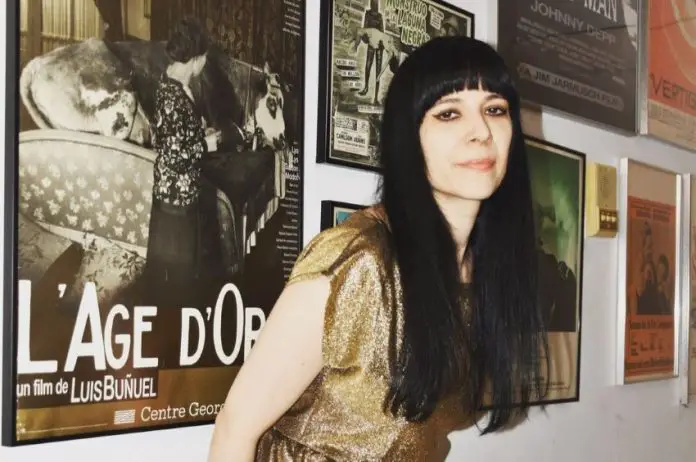Over four days at this year’s Morelia Film Festival, one film became the word-of-mouth hit. On a humid Saturday evening on the opening weekend, some of us felt breathless yet unable to stop talking about “Goodbye Horses: The Many Lives of Q Lazzarus,” the film that was later awarded the Audience Award for Mexican Documentary Feature Film.
The film is the latest documentary by Mexican-American filmmaker Eva Aridjis Fuentes, whose lens often tilts towards misfits, underdogs and those who life has dealt a unique hand. Brought up across various cultures, Eva’s sensitivity to the outsider seems to spin coincidences. None moreso than in creating this documentary, which handles ideas of fate and the uncanny paths of life almost as much as the subject of the film itself.

“Goodbye Horses: The Many Lives of Q Lazzarus” is about a singer whose song you probably know, but whose name you most likely don’t. Released in 1998, “Goodbye Horses,” the track that gives the film its name, is a melancholic floor-filler that has pervaded dancefloors and soundtracks for decades.
Sometime in the 1980s, Hollywood director Jonathan Demme was picked up by a New York taxi driver experimenting with some tracks in her car. Enraptured, Demme used the driver’s song “Goodbye Horses” in his 1988 film “Married to the Mob.” In 1991, he used the song again in his blockbuster “Silence of the Lambs,” drilling the track into the public consciousness. It appeared again in 1993’s “Philadelphia,” where the person behind the unmistakable, earthy voice finally makes a brief appearance.
Diane Luckey — a.k.a. the musician Q Lazzarus — had a lifetime of twists of fate that brought her both as close to the precipice of global fame and as far away from it as possible. In 2019, the “Searching for Q Lazzarus” was published in Dazed and Confused in which a journalist went on the hunt for the elusive singer. The journalist never found Q, who became an urban myth and catnip for internet sleuths.
Four months after the article came out, and 30 years after Jonathan Demme’s taxi encounter, Eva Aridjis got into a New York cab driven by a woman with a colourful turban, a strange star quality and a deep knowledge of music. Eva soon suspected she had just accidentally stepped straight into the legendary singer’s real life. She was right.
Mexico News Daily: I haven’t had a communal cinema experience like that for a long time, where the whole room was in tears by the end of the film. Were you surprised by that kind of reaction?
Eva Aridjis: Well, you know, I’ve been working on this project for five years, which is the longest I’ve ever worked on a film, and it was the hardest film I’ve ever made. For one thing, it was supposed to be completed much sooner and have this happy ending: Q’s comeback tour. I was going to play with the Lazarus part of her name and the structure was going to be the rise and the fall, the resurrection — but that obviously didn’t happen.
There was also the pandemic, which affected funding [Eva raised money to finish the film through a Crowdfunder campaign] but it also meant Q and I had this intense, intimate time together. And, as I think comes across in the documentary, we became incredibly close. It was a big deal for her to trust me and go back to difficult parts in her life that she’d never spoken to anybody about. Even her son, James, didn’t know most of these stories about her — he heard them for the first time in Morelia with everyone else.
But the fact that the legacy of this woman, who is talking from such a place of experience and wisdom, wound up in my hands is very moving for me. And I think it’s impossible not to fall in love with her. She’s this amazing person, you know, expressive and not jaded, wearing all these different wigs in the film, always positive despite her experiences.
So yes, I was happy to see that it was moving other people too because that’s really the whole point of the film. It’s not so much now to get her career restarted but to have this appreciation and attention that she deserves.

MND: There’s a lot about chance and coincidence in the film. The way you met for starters. What were your thoughts and feelings around destiny and the fated paths of life as you made it?
EA: Q and I both very much felt that our meeting was fated. I was aware of her Jonathan Demme story and this idea of two directors meeting her in her taxi and making films with her thirty years apart. I mean, apart from anything, if it wasn’t for Jonathan hearing this tape Q was playing around with, that song would probably be in the garbage somewhere.
On the day I got into Q’s car it was one of those days where everything is just a bit off: I usually take the subway, but I was running late so I got a cab; she didn’t usually work nights but was taking one last shift; her GPS wasn’t working so she asked me for directions: that’s when she said she didn’t know the area because she was from Staten Island.
I had read the Dazed and Confused article [four months earlier, in April 2019] and had been talking about it with a friend — we even spoke about how great it would be to make a film about her — so it was in my mind that she was living in Staten Island. I found it strange she was listening to Neil Young’s “Harvest” — like the whole album start to finish, not just a song on the radio. When I asked her whether she’d ever come across an artist called Q Lazzarus, and she told me her “concert days were over,” that’s when I suspected who she was.
I showed her photos of a t-shirt line I had made when my daughter was born: this one with “Goodbye Horses” and a rocking horse on it. She later told me that when she saw I was also a mother, that’s when she trusted me. I left her my number and some days later she called me to say she’d had a dream about me. I was like “Was this a good dream or a bad dream?” She was like: “Girl, if it was a bad dream, I wouldn’t be calling you.”
View this post on Instagram
She said that in the dream she was performing and that it felt powerful and strange because she hadn’t performed in fifteen years, and that in the dream-performance I was there with her. That’s when she said: let’s meet.
Around that time there were lots of internet sleuths looking for Q Lazzarus. She’d become a cult figure and a kind of myth. How did she feel about that when you met her?
She was upset by them. I mean, she didn’t have a computer, she didn’t have social media, she wasn’t really on the internet. [Q’s son] James told her there were people looking for her so she responded just to say she was alive and didn’t want to be found. But then this other person started pretending to be her, publishing tweets and stuff in her voice and that really upset her.
She had no plans to return to music or to the public eye, really, until I got into her car and we started the documentary. There was this idea around Q that she had bad timing. That she was “ahead” of her time, a rock and roll artist the world wasn’t ready for. And when the world was ready and handed her a chance, something would suddenly happen that changed her life’s course.

One of her old acquaintances had said there was an irony in her surname being Luckey. But I don’t know if I fully agree with that. She had an extraordinary life — enough experience for many lifetimes, which is why I chose the title. More to come, even. There was a time when I was thinking of getting a composer to do a score and then I was like: no, I only want to use her music. And if there’s a moment with just silence so be it. That’s what it was like in her lifetime. There was no music. She wasn’t making music, she wasn’t listening to music. Maybe it’s okay sometimes to not have music, you know?
This idea of overlooked talent, of Q finally getting deserved recognition after so much hardship, really got into people’s hearts at the festival. How do you hope audiences in Mexico will react to the film in particular?
Well, this is a music documentary in the sense that it’s about a singer and the music she made. There are parallels with “Searching for Sugarman,” for example. But I think it’s also about so many other themes: whether it’s a story of a mother and a son, of social justice, of heartbreak. I’ve had lots of young people responding to it and that’s exciting — that kids are hyped about a documentary instead of a big Hollywood feature with all the bells and whistles.
In the United States, it’s a bit different. It’s very much also the story of an African American woman who was affected by her race, from the music industry to the judicial system to the medical system. But in the end it’s just the story of an extraordinary woman and a talent that most people don’t know exists.That’s what I hope will land with anyone watching the film.
Bettine is from the Highlands of Scotland and now lives in Mexico City, working in film development at The Lift, Mexico’s leading independent audiovisual production company.
